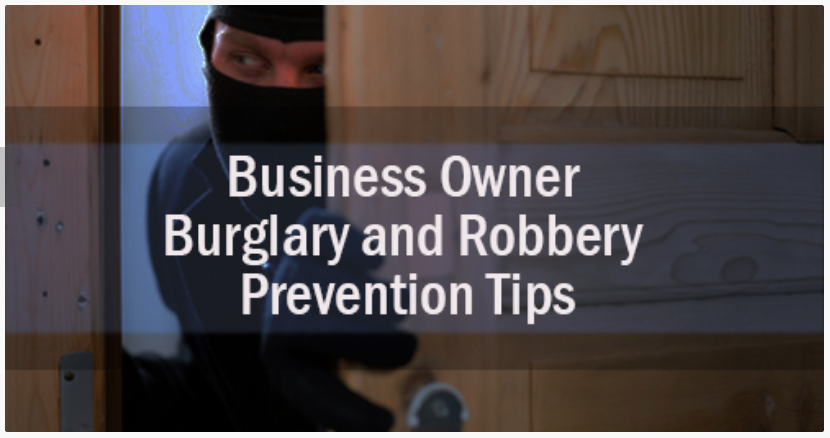
Crimes against businesses are usually crimes of opportunity. Failure to take good security precautions invites crime into a business.
Burglary Prevention
- Make sure all outside entrances and inside security doors have deadbolt locks. If you use padlocks, they should be made of steel and kept locked at all times. Remember to remove serial numbers from your locks, to prevent unauthorized keys from being made.
- All outside or security doors should be metal-lined and secured with metal security crossbars. Pin all exposed hinges to prevent removal.
- Windows should have secure locks and burglar-resistant glass. Consider installing metal grates on all your windows except display windows.
- Remove all expensive items from window displays at night and make sure you can see easily into your business after closing.
- Light the inside and outside of your business, especially around doors, windows, skylights, or other entry points. Consider installing covers over exterior lights and power sources to deter tampering.
- Check the parking lot for good lighting and unobstructed views.
- Keep your cash register in plain view from the outside of your business, so it can be monitored by police during the day or at night. Leave it open and empty after closing.
- Be sure your safe is fireproof and securely anchored. It should be kept in plain view. Leave it open when it’s empty, use it to lock up valuables when you close. Remember to change the combination when an employee who has had access to it leaves your business.
- Before you invest in an alarm system, check with several companies and decide what level of security fits your needs. Contact your local law enforcement agency to recommend established companies. Learn how to use your system properly. Check the system daily, and run a test when closing.
Robbery Prevention
Robbery doesn’t occur as often as other crimes against businesses, but the potential for loss can be much greater from a single incident. Also, robbery involves force or threat of force and can result in serious injury or death.
- Greet every person who enters the business in a friendly manner. Personal contact can discourage a would-be criminal.
- Keep windows clear of displays or signs and make sure your business is well-lighted. Check the layout of your store, eliminating any blind spots that may hide a robbery in progress.
- Provide information about your security systems to employees only on a “need-to-know” basis. Instruct your employees to report any suspicious activity or person immediately and write down the information for future reference.
- Place cash registers in the front section of the store. This increases the chances of someone spotting a robbery in progress and reporting it to the police.
- Keep small amounts of cash in the register to reduce losses. Use a drop safe into which large bills and excess cash are dropped by employees and cannot be retrieved by them. Post signs alerting would-be robbers of this procedure.
- Make bank deposits often and during business hours. Don’t establish a pattern, take different routes at different times during the day. Ask a police officer to escort you to the bank whenever possible.
- Ask local law enforcement what to do in case you are robbed. Make sure your address is visible so emergency vehicles can easily find your business.
- If you or your employees are confronted by a robber, cooperate. Merchandise and cash can always be replaced—people can’t!
The above is an excerpt adapted from the article,”Small Business Crime Prevention.”
